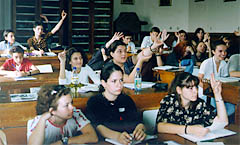 The
Centers offer a core curriculum and courses designed to meet the needs of participants who
are grouped by experience and special interests. Classes are taught in local languages or
in English with a translator. Methods of instruction include classroom lectures,
workshops, practical fieldwork, one-on-one consultancy and informal discussions groups.
Overall, we emphasize practical training. In practice this means learning through
experience by providing actual opportunities to write for print, radio, and T.V., as well
as produce newscasts and documentaries and take news photographs.
The
Centers offer a core curriculum and courses designed to meet the needs of participants who
are grouped by experience and special interests. Classes are taught in local languages or
in English with a translator. Methods of instruction include classroom lectures,
workshops, practical fieldwork, one-on-one consultancy and informal discussions groups.
Overall, we emphasize practical training. In practice this means learning through
experience by providing actual opportunities to write for print, radio, and T.V., as well
as produce newscasts and documentaries and take news photographs.
Print Journalism
The curriculum offers courses in basic, investigative and computer-assisted reporting,
community and cultural reporting, fact gathering and checking, analysis, feature writing,
editing, standards of fairness and the ethics of journalism. Specialized training is
given in economics and business reporting, health/environmental and science reporting, and
research techniques, including the use of the Internet and Bloomberg business computer
system. Workshops on photojournalism and desktop publishing, and seminars on topical
subjects such as election reporting are also regular features of our program.
 Broadcast Journalism
Broadcast Journalism
Our Centers teach the essentials of modern electronic journalism. Courses include basic
reporting, field reporting, interviewing techniques, writing to images, editing, voice
training, on-air panel moderating, newsroom organization, and production. To keep up with
developments in broadcasting, we are offering training with portable digital cameras and
editing equipment that will allow professionals and students to produce documentaries and
news magazines that are effective and inexpensive.
Business and Other Courses
The Centers offer targeted assistance to organizations that request it, designing programs
covering the wide range of disciplines required to run a successful media business.
Including, one-on-one personalized consultation is offered by visiting professionals.
Workshops cover the key aspects of media business-advertising, marketing,
circulation, sales, production budgeting, and distribution. Seminars are also given on
radio and television station management, marketing sales and audience research. In
addition, the Centers offer courses on the law applying to the media in each country.
Ethics and media law, including risks and responsibilities facing reporters, editors and
publishers, are thoroughly explored.
Professional Enrichment
A hallmark of IJF's approach to journalism training is its rich range of Center-based
activities. We were, for example, the first of the region's media centers to hold
regularly scheduled Debate Club nights, open forums with featured speakers and free
ranging discussions of issues of the day. These groups have grown in popularity. Our
directors hold informal "Brown Bag" luncheon talks, invite major newsmakers to
speak at formal gatherings and organize Roundtable discussions. We show documentaries and
theatrical films, and mount photo and cartoon exhibitions - all related to journalism and
public affairs. We recruit journalists for fellowships and organize job fairs. We are
always open to ideas for new events. By using our physical spaces imaginatively, we hope
to broaden the experience of local journalists and build unique identities for our
Centers, based on their results and reputation.
Next: Impact of IJF
History | Independent Journalism Foundation's Role | The Centers for Independent Journalism | Comprehensive Practical Training | Impact of IJF | New Programs | Programs | Our Supporters | IJF Officers | To Contribute | Feedback | Eligibility | Visiting Trainers